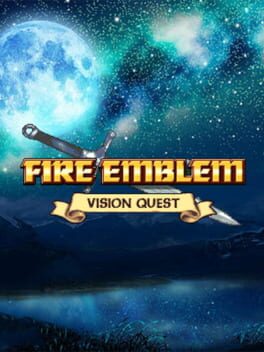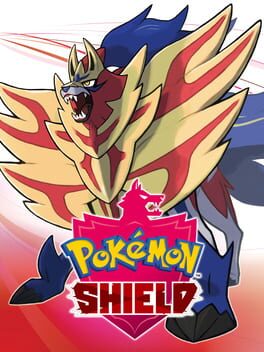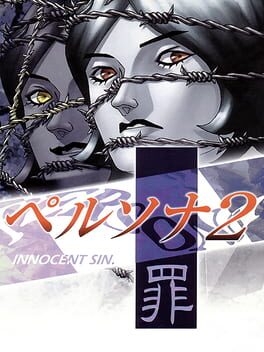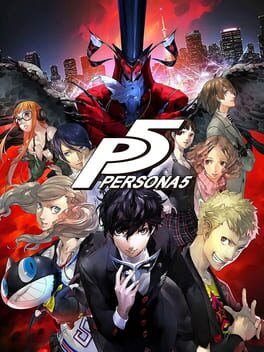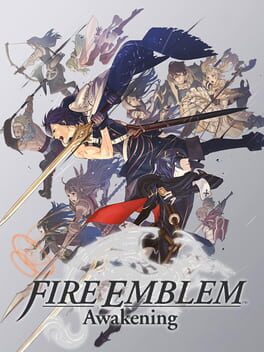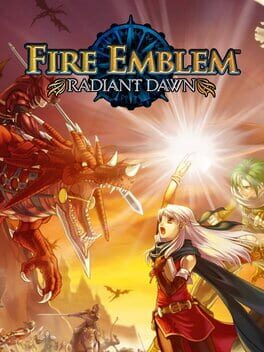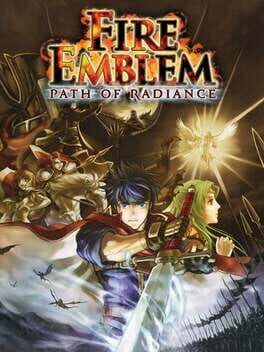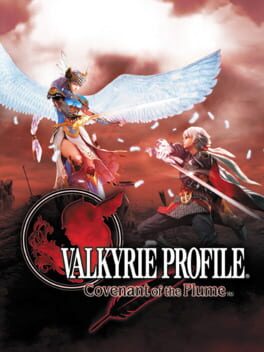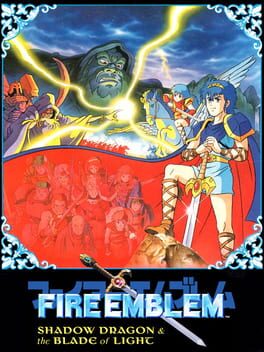HeeHo
11 Reviews liked by HeeHo
This game is solid but not flawless
first of all gaemplay it's absolutely fantastic it's probably the most balanced Fire Emblem period wich is crazy but also it doesn not sacrifice class (not unit) identity somthing that IS itself is struggeling (look at modern theif classes) but like you noticed i didn't say unit identity well while bases are great personal skills 9/10 are kinda pointless and growths are comically similar not THAT similar but is a bunch of 40s and 50s 20s for defense cuz onlly Great Knights (shoutouts to Stina) and Armors can have defense is not that big but still is somthing i felt vision quest is a fair game more than any other fire emblem personally as a player and a hack creator i like unfairness as a matter of fact Thracia's unfairness and luck dependency help it's ludonarrative but overall the map design is fantastic enemies strong and your units too some of the best FE gameplay
now story it's really good but i don't think it's better than the best of Fire Emblem tellius outdoes them in worldbuilding and cool factor but mainly why i can't say is a great FE story is becouse it "this guy hunts dark mages so his resistence growth is high" but still not even in the hardest maps you get somthing like getting your 4sshole teared open trying to defend your castle from a siege i will say early part 1 and 3 have such tight resources that you feel pressured but not as much as Thracia early game maybe becouse your units always feel kinda competent and the game being SO iron man friendly (wich is not inherently good but the game wanted that so it is)
i'll say this my main issue is the music and not in the "gba sounds bad!" way the ost alone? is so good but like it's comically unfitting it feels like they tried to just put songs that loosely fit just becouse they liked the song shit is comical like why is Seaside Hill sounding after we defeat a cheif trying to kill young animals becouse his tribe is literally starving??? im sorry but the music is an absolute disaster if the teams tries to do anything again please think of ambience first i know there are many good songs you want to use but holy shit find a place
anyways shoutouts to Bulan and Stina gotta be my favorite lesbians behind my oomf!
first of all gaemplay it's absolutely fantastic it's probably the most balanced Fire Emblem period wich is crazy but also it doesn not sacrifice class (not unit) identity somthing that IS itself is struggeling (look at modern theif classes) but like you noticed i didn't say unit identity well while bases are great personal skills 9/10 are kinda pointless and growths are comically similar not THAT similar but is a bunch of 40s and 50s 20s for defense cuz onlly Great Knights (shoutouts to Stina) and Armors can have defense is not that big but still is somthing i felt vision quest is a fair game more than any other fire emblem personally as a player and a hack creator i like unfairness as a matter of fact Thracia's unfairness and luck dependency help it's ludonarrative but overall the map design is fantastic enemies strong and your units too some of the best FE gameplay
now story it's really good but i don't think it's better than the best of Fire Emblem tellius outdoes them in worldbuilding and cool factor but mainly why i can't say is a great FE story is becouse it "this guy hunts dark mages so his resistence growth is high" but still not even in the hardest maps you get somthing like getting your 4sshole teared open trying to defend your castle from a siege i will say early part 1 and 3 have such tight resources that you feel pressured but not as much as Thracia early game maybe becouse your units always feel kinda competent and the game being SO iron man friendly (wich is not inherently good but the game wanted that so it is)
i'll say this my main issue is the music and not in the "gba sounds bad!" way the ost alone? is so good but like it's comically unfitting it feels like they tried to just put songs that loosely fit just becouse they liked the song shit is comical like why is Seaside Hill sounding after we defeat a cheif trying to kill young animals becouse his tribe is literally starving??? im sorry but the music is an absolute disaster if the teams tries to do anything again please think of ambience first i know there are many good songs you want to use but holy shit find a place
anyways shoutouts to Bulan and Stina gotta be my favorite lesbians behind my oomf!
Silent Hill
1999
Pokémon Shield
2019
Name one game that looks better. YOU CAN’T! One of the best looking games of all time with great commentary on deforestation through its tree models. Subtle social commentary on Brexit due to its culling of the National Dex. One of humanity’s best achievements. Intelligent allegorical discussion of corrupt Reddit moderation is provided through Team Yell as well. An amazing ludonarrative that draws parallels and uses allegory and metaphor to represent our real world with its Pokemon.
Worse than alone / Exiled.
The second game in the Persona series sets out to build and improve upon everything found in the first game. Admittedly the game was very hyped up as being the best the franchise offers, and I can certainly see why. The game is dripping with symbolism trenched deep into a plot involving some of the craziest scenarios in the series, but one that ultimately has a heart at the center of it all.
For starters, I think the gameplay is an improvement of Persona 1's in every aspect....but that still doesn't mean it's the best either. Dungeons are the worst example; they're largely monotonous and too long for their own good at later points in the game. Combat is certainly unique and challenging, but I can't help but feel like it's not all that engaging. A new mechanic that I actually really like is the Rumor System; it has more depth than I was expecting, and I love how it's an extension of the main narrative itself. While you're going around town, spreading rumors, or buying items, the game's excellent soundtrack is also there to keep you company, and I love the instrumental variety featured in the OST.
Worse than exiled / Dead.
Ultimately, I think the strongest part of Innocent Sin lies in its narrative. The storytelling method is quite different from the first game, and I think it works for the story they're going for here. An ever-longing pain emanates from each of the main cast from your first encounter with them, and their struggles were very explored very well. I do think there are some hiccups though, as I can't help but feel the last party member that joins is never given enough interaction with the rest of the cast for me to get a proper handle on what kind of person he is. His struggles were laid out well, but I think the game could've benefited from having a few more scenes with him.
Besides that, I think almost everyone is well-written, and I love the moments where we get to know each character. Whether it be Maya's messy room, Eikichi's dreams of becoming a rock star, or Lisa's habit of blurting out Cantonese phrases, I loved getting to know these characters and exploring the town of Sumaru City. This game reminded me why I fell in love with Persona and Megami Tensei years ago.
Worse than dead / Forgotten.
The second game in the Persona series sets out to build and improve upon everything found in the first game. Admittedly the game was very hyped up as being the best the franchise offers, and I can certainly see why. The game is dripping with symbolism trenched deep into a plot involving some of the craziest scenarios in the series, but one that ultimately has a heart at the center of it all.
For starters, I think the gameplay is an improvement of Persona 1's in every aspect....but that still doesn't mean it's the best either. Dungeons are the worst example; they're largely monotonous and too long for their own good at later points in the game. Combat is certainly unique and challenging, but I can't help but feel like it's not all that engaging. A new mechanic that I actually really like is the Rumor System; it has more depth than I was expecting, and I love how it's an extension of the main narrative itself. While you're going around town, spreading rumors, or buying items, the game's excellent soundtrack is also there to keep you company, and I love the instrumental variety featured in the OST.
Worse than exiled / Dead.
Ultimately, I think the strongest part of Innocent Sin lies in its narrative. The storytelling method is quite different from the first game, and I think it works for the story they're going for here. An ever-longing pain emanates from each of the main cast from your first encounter with them, and their struggles were very explored very well. I do think there are some hiccups though, as I can't help but feel the last party member that joins is never given enough interaction with the rest of the cast for me to get a proper handle on what kind of person he is. His struggles were laid out well, but I think the game could've benefited from having a few more scenes with him.
Besides that, I think almost everyone is well-written, and I love the moments where we get to know each character. Whether it be Maya's messy room, Eikichi's dreams of becoming a rock star, or Lisa's habit of blurting out Cantonese phrases, I loved getting to know these characters and exploring the town of Sumaru City. This game reminded me why I fell in love with Persona and Megami Tensei years ago.
Worse than dead / Forgotten.
Persona 5
2016
Dark Souls III
2016
This review contains spoilers
While i personally enjoyed this game more than Path of Radiance and consider the story slightly better overall part 1 gets really affected from not being a full game as we don't really see a lot of Daein's suffering honestly
after chapter 3 the whole "Daein is getting fucked over by Begnion after losing the war!" is gone and is replaced with a liberation arc that is nowhere near as good as the one in Path of Radiance i wish they explored more of that honestly the first 2 parts get hurt for being too short due to the game being multiple parts the second not as much but like with Daein we need to see more of the chaos in Crimea
The story takes a MASSIVE quality leap once you enter part 3 but imagine the confrontations with the Dawn Brigade if instead of just having a glipse at what got them there and how they sufferd we got to see a good amount of their struggle to live after the war
regardless as villains the Dawn Brigade and the new Daein work fantastically BUT yeah they could been better seeing how patriotism puts good people like Sothe Micaiah Nolan and the poor innocent idealistic Edward to assist a nation they DESPISED in genocide just becouse their loyality to Daein would been so good instead we got the blood pact puting Daein as "they are forced to" wich is much less interesting than "they are good people but they blindly serve their country" we see Micaiah reflect on that in one base conversation saying that "she doesn't care if she gets compared to the Ashnard she will fight for Daein anyways"
chapter 3-12 is one of my favorites becouse it shows how the war is changing Micaiah to the point of doing somthing as fucked up as almost burning an army in a trap (wich i don't know about war much but im pretty sure thats a war crime) Micaiah's patritism is toxic and it's turning her into a horrible person becouse in her mind Daein is above everything and thats amazing imagine if they went further with it instead of using the blood pact as an excuse to make her look like the good girl still? they could have made her arc in part 4 growing out of that and learning to stop fighting for a country and instead fight for it's people no longer blindly following what her king and country say but instead what she knows and feels is right
is honestly such a waste of potential to both not show us more of Daein suffering (and Crimea's conflict but that a little less) and also the blood pact making Daein "still good guys tho!" when fighting good people that are too patriotic to a sick degree i would have rather if they went with the direction
i will say tho asides from the Dawn Brigade problems part 3 is perfect and absolute kino part 4 has even less flaws my main problems storywise is the wasted potential of the Dawn Brigade outside of that is peak fiction
the difficulty maps wepons and overall gameplay is so much better in this game is more fun than Path of Radiance and the game is mad fun team building and strategy are way more engaging and hard
also Ike and Soren are even gayer so everything is forgiven except for Micaiah being a shit lord 4.5/5
after chapter 3 the whole "Daein is getting fucked over by Begnion after losing the war!" is gone and is replaced with a liberation arc that is nowhere near as good as the one in Path of Radiance i wish they explored more of that honestly the first 2 parts get hurt for being too short due to the game being multiple parts the second not as much but like with Daein we need to see more of the chaos in Crimea
The story takes a MASSIVE quality leap once you enter part 3 but imagine the confrontations with the Dawn Brigade if instead of just having a glipse at what got them there and how they sufferd we got to see a good amount of their struggle to live after the war
regardless as villains the Dawn Brigade and the new Daein work fantastically BUT yeah they could been better seeing how patriotism puts good people like Sothe Micaiah Nolan and the poor innocent idealistic Edward to assist a nation they DESPISED in genocide just becouse their loyality to Daein would been so good instead we got the blood pact puting Daein as "they are forced to" wich is much less interesting than "they are good people but they blindly serve their country" we see Micaiah reflect on that in one base conversation saying that "she doesn't care if she gets compared to the Ashnard she will fight for Daein anyways"
chapter 3-12 is one of my favorites becouse it shows how the war is changing Micaiah to the point of doing somthing as fucked up as almost burning an army in a trap (wich i don't know about war much but im pretty sure thats a war crime) Micaiah's patritism is toxic and it's turning her into a horrible person becouse in her mind Daein is above everything and thats amazing imagine if they went further with it instead of using the blood pact as an excuse to make her look like the good girl still? they could have made her arc in part 4 growing out of that and learning to stop fighting for a country and instead fight for it's people no longer blindly following what her king and country say but instead what she knows and feels is right
is honestly such a waste of potential to both not show us more of Daein suffering (and Crimea's conflict but that a little less) and also the blood pact making Daein "still good guys tho!" when fighting good people that are too patriotic to a sick degree i would have rather if they went with the direction
i will say tho asides from the Dawn Brigade problems part 3 is perfect and absolute kino part 4 has even less flaws my main problems storywise is the wasted potential of the Dawn Brigade outside of that is peak fiction
the difficulty maps wepons and overall gameplay is so much better in this game is more fun than Path of Radiance and the game is mad fun team building and strategy are way more engaging and hard
also Ike and Soren are even gayer so everything is forgiven except for Micaiah being a shit lord 4.5/5
Best game of all time Ike is awesome and the best video game protagonist ever also he's gay and thats very cool methinks
for a begginer (me) the game was not that hard even when i played on hard BUT my Ike got rng blessed so idk the story is peak also don't support anyone with Ike unless is Soren trust me
for a begginer (me) the game was not that hard even when i played on hard BUT my Ike got rng blessed so idk the story is peak also don't support anyone with Ike unless is Soren trust me
As far as I’m concerned the grand innovation of 1990’s Fire Emblem: Shadow Dragon and the Blade of Light is the introduction of mechanics and storytelling concepts typical of JRPGs into the strategy game genre for the purpose of crafting a more intimate ludonarrative. Marriage between gameplay and story, and even the word ludonarrative itself, are kind of played out concepts for games criticism at this point. That being said, the original Fire Emblem stands tall as both a landmark moment in video game history and a remarkable example of the concept even today and, because of that, I think it’s worth discussing. In preparation for this analysis I played the game twice, firstly through its original Famicom release and secondly on the Switch using the 2020 official English localization. I will not be referencing either the Super Famicom or DS remakes of this game, or any other Fire Emblem in this write up. Mild spoilers to follow.
War stories are a common aspect of not just strategy games but games as a whole; and for good reason. The context of a fight to the death is both universally understandable and inherently interesting. In a move clearly inspired by 80’s sci-fi classics like Mobile Suit: Gundam and Legend of the Galactic Heroes, Fire Emblem decides to characterize its combat not through a heavy action focus but through an exploration of the drama, characters, strategy, and resource management associated with large scale conflict. This isn’t to imply that an action focus is somehow “lesser” than what Fire Emblem does, but it was still quite a bold direction for the time.
Those who have played the game may find my mention of “drama” to be curious. As a Famicom game, Fire Emblem’s script is quite small. A cursory search on YouTube shows that all cutscenes in the game including optional village dialogue take less than an hour to watch. In that hour, only the circumstances surrounding a certain late game enemy general can be considered particularly “dramatic.” This, however, is offset by a system that is nothing short of transformative for the game, permadeath. The fact that every single character in your party can die at any given point in the story and that their death has logical mechanical and narrative consequences allows for an absolutely insane level of emergent storytelling for the game. Thanks to Fire Emblem’s focus on encounter variety and level design all of this “emergent storytelling” is also way more complex and interesting than JRPGs of its time. While in the original Dragon Quest one could describe most interactions with “X healed/damaged Y” Fire Emblem provides something richer. “When reinforcements spawned from behind I had to leave Hardin at the fort so he could stall the enemies while Marth raced to the throne, hoping to seize in time before Hardin died.” Instead of relying on narrative expository set pieces to contextualize its battles, Fire Emblem can present you with such a dynamic story entirely through its mechanics AND THEN permadeath ties that scenario right back into the actual narrative. While most characters do not have a very grand effect on the story when they die; thanks to the game's small script every single one affects a more significant part of the story than most games just through their own character endings. And of course the mechanical loss of a character is intrinsically linked to the narrative as we’ve mentioned already. When people speak about a game’s narrative themes being represented in gameplay they often do so through vapid metaphor by saying something like “the necessity of persevering is conveyed through the game rewarding you for pressing on.” Similarly, when developers try to marry their gameplay and narrative often times it is boiled down to a series of transparent binary choices. Fire Emblem did not see fit to articulate itself with such basic design and, as such, cannot be analyzed effectively that way. Even though permadeath is often avoided by series fans through the process of save scumming (and the developers of the original Fire Emblem were keenly aware this would be the case) I implore you to play this game without resetting if you give it a shot. While the process of engineering a so-called “perfect playthrough” can be quite engaging in its own right, the beauty of Fire Emblem is on full display in an “ironman run.”
The intensity lended to every situation by permadeath also does a great deal to characterize the player’s units. While the variety of classes and statistics do a lot of good for making the game's roster feel more diverse, those aforementioned anecdotal play experiences are paramount to characterizing the characters. When speaking about the game. designer Shouzou Kaga said “Yeah, as much as possible, we tried to remove ‘stats’ and numerical data. We tried to make it so that even without relying on stats, players could still get a sense of an enemy being really powerful by how much damage they dealt.” While this ambition to remove stats from a turn based strategy game is on the surface, kind of flawed, the desire to convey characters through their mechanical play experience is something I find to be extremely valuable. If you sit two people down who have played Fire Emblem once, even if they used the same units, they likely have completely different thoughts on how useful they are just by virtue of the dynamic nature of unit growth and combat. The unit growth system is also a very clever design decision in that it allows units to trend toward certain baselines while keeping them varied enough that maps are not linearly solvable in the way traditional puzzle/strategy games are.
Of course in most games the player characters are only half the equation. I suspect that because the characterization of player units is largely determined by the player, Intelligent Systems decided to focus pretty heavily on diversifying enemy behavior. Basic enemies can be stationary, aggressive, wait for you to get within movement range, and even flee to be healed when they’re on low HP. Beyond that about 1/3 of your playable units actually start off as enemies. A cute little detail about this is that because Marth is not an avatar for the player and wouldn’t be aware of which enemies are friendly you often can’t recruit enemies by talking with Marth, instead they have to talk to him of their own accord. Similarly units like Minerva behave irrationally for “enemy” units because of course their disposition as a character is more complex than just being an enemy. This culminates in the iconic 20th chapter of the game “Camus the Sable,” where Fire Emblem spins its most dramatic narrative. The decision to make Camus impossible to recruit is a clear homage to Mobile Suit: Gundam again, but the effectiveness of this trope in adding reality to the world of the original Fire Emblem shouldn’t be understated. Camus is effectively the most complex character in the entire game and you can’t recruit him! The realities of war, where your enemies acknowledge the errors of their way and die for them anyway because of the context of their lives. Good stuff.
Strategy is of course the name of the game with Fire Emblem and even from this first outing most of the mechanics are very well considered. Of particular note to people who may be familiar with the genre is the way Fire Emblem structures its turns to emphasize thinking ahead. In Fire Emblem you have the opportunity to move every player unit once before the enemy gets the opportunity to move all of theirs. The significance of this combined with the relatively predictable AI is that you have to plan to take multiple attacks from the enemy before you are able to respond and don’t have to play as reactive as you would in a game with smaller turns. The game also offers a large amount of incentives for most of its maps that encourage the player to charge ahead and meet the enemy head on to prevent turtling, which would otherwise become a boring and dominant strategy. Every map also requires Marth to seize the throne (well I guess the last one is defeat boss) which is a solid objective when compared to something like routing the enemy as it allows the players to rush the throne with their strong units and warp staff for an early clear or methodically work their way through the map and move their inventory around afterwards if that’s what they’re into. Inventory is honestly quite the drag on this game's pacing. I won’t dwell on it here because it’s not particularly interesting but there’s some convenient tips on how to make it as painless as possible by one of my friends at the bottom of this post.
There are a few other complaints I’ll take the time to make here. Weapon stats and formulas are all contained within the manual but Nintendo of America didn’t actually translate that part of the manual so you’ll have to use sites like Serenes Forest to get weapon stats. Units also make any tile they’re standing on look like a grass tile even when it isn’t one (assumedly because of some sprite limitation) which can be a minor annoyance as terrain is important in this game. Also while most recruitments are pretty transparent as the game makes excellent use of its sparse script in setting up characters and situations, some of them are not very obvious which can lead to very slow trial and error recruitments(Just google it if you don’t know). Marth is also an absurdly strong unit and it seems the AI has a tendency to target him, assumedly because his death can cause a game over, which can lead them to kind of suiciding on him a bit too often.
Yet another stroke of genius in the design of the original Fire Emblem is its limited resource economy. Money balancing is unfortunately way too much in the players favor but the decision to forgo the ability to grind brainlessly to make the game easier, does a lot for the game. Experience is a limited resource in Fire Emblem. It adds a long game of strategy to the experience. At any given time you’re considering trade-offs of options in the short term (surviving the current situation,) mid term (how you outfit your units for the next couple maps,) and long term(which units you plan to take a risk on investing in.) This consideration is almost more reminiscent of classic Resident Evil than it is Dragon Quest. Fire Emblem does actually have a way to grind infinite experience and money though. In maybe one of the games most charming touches, on any map with an arena you can gamble your money on your units ability to win a one on one fight, but if you lose that fight you’re paying with not just your gold but also your life. Some really intense risk reward right there. Good shit.
At the end of the day it’s hard to call Fire Emblem: Shadow Dragon and the Blade of Light anything but a classic. While the game has its misses, particularly in regards to quality of life decisions, this game really does showcase a confident core design philosophy that exemplifies many of the strengths of games as a medium. It’s hard to find a turn-based RPG with a tighter mechanical loop than Fire Emblem. Consider giving it a shot if you have the chance.
Thanks for reading y’all. If you have any feedback I’d love to hear it as I plan to expand on this and then turn it into video. (Also forgot to mention but Tsujiyoko and Tanaka made a straight dootin’ ost)
FE1 Inventory management tips https://www.reddit.com/r/fireemblem/comments/ik7j40/how_to_make_the_fe1_inventory_as_painless_as/
Also go read this
http://shaym.in/fe1/lp.html
War stories are a common aspect of not just strategy games but games as a whole; and for good reason. The context of a fight to the death is both universally understandable and inherently interesting. In a move clearly inspired by 80’s sci-fi classics like Mobile Suit: Gundam and Legend of the Galactic Heroes, Fire Emblem decides to characterize its combat not through a heavy action focus but through an exploration of the drama, characters, strategy, and resource management associated with large scale conflict. This isn’t to imply that an action focus is somehow “lesser” than what Fire Emblem does, but it was still quite a bold direction for the time.
Those who have played the game may find my mention of “drama” to be curious. As a Famicom game, Fire Emblem’s script is quite small. A cursory search on YouTube shows that all cutscenes in the game including optional village dialogue take less than an hour to watch. In that hour, only the circumstances surrounding a certain late game enemy general can be considered particularly “dramatic.” This, however, is offset by a system that is nothing short of transformative for the game, permadeath. The fact that every single character in your party can die at any given point in the story and that their death has logical mechanical and narrative consequences allows for an absolutely insane level of emergent storytelling for the game. Thanks to Fire Emblem’s focus on encounter variety and level design all of this “emergent storytelling” is also way more complex and interesting than JRPGs of its time. While in the original Dragon Quest one could describe most interactions with “X healed/damaged Y” Fire Emblem provides something richer. “When reinforcements spawned from behind I had to leave Hardin at the fort so he could stall the enemies while Marth raced to the throne, hoping to seize in time before Hardin died.” Instead of relying on narrative expository set pieces to contextualize its battles, Fire Emblem can present you with such a dynamic story entirely through its mechanics AND THEN permadeath ties that scenario right back into the actual narrative. While most characters do not have a very grand effect on the story when they die; thanks to the game's small script every single one affects a more significant part of the story than most games just through their own character endings. And of course the mechanical loss of a character is intrinsically linked to the narrative as we’ve mentioned already. When people speak about a game’s narrative themes being represented in gameplay they often do so through vapid metaphor by saying something like “the necessity of persevering is conveyed through the game rewarding you for pressing on.” Similarly, when developers try to marry their gameplay and narrative often times it is boiled down to a series of transparent binary choices. Fire Emblem did not see fit to articulate itself with such basic design and, as such, cannot be analyzed effectively that way. Even though permadeath is often avoided by series fans through the process of save scumming (and the developers of the original Fire Emblem were keenly aware this would be the case) I implore you to play this game without resetting if you give it a shot. While the process of engineering a so-called “perfect playthrough” can be quite engaging in its own right, the beauty of Fire Emblem is on full display in an “ironman run.”
The intensity lended to every situation by permadeath also does a great deal to characterize the player’s units. While the variety of classes and statistics do a lot of good for making the game's roster feel more diverse, those aforementioned anecdotal play experiences are paramount to characterizing the characters. When speaking about the game. designer Shouzou Kaga said “Yeah, as much as possible, we tried to remove ‘stats’ and numerical data. We tried to make it so that even without relying on stats, players could still get a sense of an enemy being really powerful by how much damage they dealt.” While this ambition to remove stats from a turn based strategy game is on the surface, kind of flawed, the desire to convey characters through their mechanical play experience is something I find to be extremely valuable. If you sit two people down who have played Fire Emblem once, even if they used the same units, they likely have completely different thoughts on how useful they are just by virtue of the dynamic nature of unit growth and combat. The unit growth system is also a very clever design decision in that it allows units to trend toward certain baselines while keeping them varied enough that maps are not linearly solvable in the way traditional puzzle/strategy games are.
Of course in most games the player characters are only half the equation. I suspect that because the characterization of player units is largely determined by the player, Intelligent Systems decided to focus pretty heavily on diversifying enemy behavior. Basic enemies can be stationary, aggressive, wait for you to get within movement range, and even flee to be healed when they’re on low HP. Beyond that about 1/3 of your playable units actually start off as enemies. A cute little detail about this is that because Marth is not an avatar for the player and wouldn’t be aware of which enemies are friendly you often can’t recruit enemies by talking with Marth, instead they have to talk to him of their own accord. Similarly units like Minerva behave irrationally for “enemy” units because of course their disposition as a character is more complex than just being an enemy. This culminates in the iconic 20th chapter of the game “Camus the Sable,” where Fire Emblem spins its most dramatic narrative. The decision to make Camus impossible to recruit is a clear homage to Mobile Suit: Gundam again, but the effectiveness of this trope in adding reality to the world of the original Fire Emblem shouldn’t be understated. Camus is effectively the most complex character in the entire game and you can’t recruit him! The realities of war, where your enemies acknowledge the errors of their way and die for them anyway because of the context of their lives. Good stuff.
Strategy is of course the name of the game with Fire Emblem and even from this first outing most of the mechanics are very well considered. Of particular note to people who may be familiar with the genre is the way Fire Emblem structures its turns to emphasize thinking ahead. In Fire Emblem you have the opportunity to move every player unit once before the enemy gets the opportunity to move all of theirs. The significance of this combined with the relatively predictable AI is that you have to plan to take multiple attacks from the enemy before you are able to respond and don’t have to play as reactive as you would in a game with smaller turns. The game also offers a large amount of incentives for most of its maps that encourage the player to charge ahead and meet the enemy head on to prevent turtling, which would otherwise become a boring and dominant strategy. Every map also requires Marth to seize the throne (well I guess the last one is defeat boss) which is a solid objective when compared to something like routing the enemy as it allows the players to rush the throne with their strong units and warp staff for an early clear or methodically work their way through the map and move their inventory around afterwards if that’s what they’re into. Inventory is honestly quite the drag on this game's pacing. I won’t dwell on it here because it’s not particularly interesting but there’s some convenient tips on how to make it as painless as possible by one of my friends at the bottom of this post.
There are a few other complaints I’ll take the time to make here. Weapon stats and formulas are all contained within the manual but Nintendo of America didn’t actually translate that part of the manual so you’ll have to use sites like Serenes Forest to get weapon stats. Units also make any tile they’re standing on look like a grass tile even when it isn’t one (assumedly because of some sprite limitation) which can be a minor annoyance as terrain is important in this game. Also while most recruitments are pretty transparent as the game makes excellent use of its sparse script in setting up characters and situations, some of them are not very obvious which can lead to very slow trial and error recruitments(Just google it if you don’t know). Marth is also an absurdly strong unit and it seems the AI has a tendency to target him, assumedly because his death can cause a game over, which can lead them to kind of suiciding on him a bit too often.
Yet another stroke of genius in the design of the original Fire Emblem is its limited resource economy. Money balancing is unfortunately way too much in the players favor but the decision to forgo the ability to grind brainlessly to make the game easier, does a lot for the game. Experience is a limited resource in Fire Emblem. It adds a long game of strategy to the experience. At any given time you’re considering trade-offs of options in the short term (surviving the current situation,) mid term (how you outfit your units for the next couple maps,) and long term(which units you plan to take a risk on investing in.) This consideration is almost more reminiscent of classic Resident Evil than it is Dragon Quest. Fire Emblem does actually have a way to grind infinite experience and money though. In maybe one of the games most charming touches, on any map with an arena you can gamble your money on your units ability to win a one on one fight, but if you lose that fight you’re paying with not just your gold but also your life. Some really intense risk reward right there. Good shit.
At the end of the day it’s hard to call Fire Emblem: Shadow Dragon and the Blade of Light anything but a classic. While the game has its misses, particularly in regards to quality of life decisions, this game really does showcase a confident core design philosophy that exemplifies many of the strengths of games as a medium. It’s hard to find a turn-based RPG with a tighter mechanical loop than Fire Emblem. Consider giving it a shot if you have the chance.
Thanks for reading y’all. If you have any feedback I’d love to hear it as I plan to expand on this and then turn it into video. (Also forgot to mention but Tsujiyoko and Tanaka made a straight dootin’ ost)
FE1 Inventory management tips https://www.reddit.com/r/fireemblem/comments/ik7j40/how_to_make_the_fe1_inventory_as_painless_as/
Also go read this
http://shaym.in/fe1/lp.html
